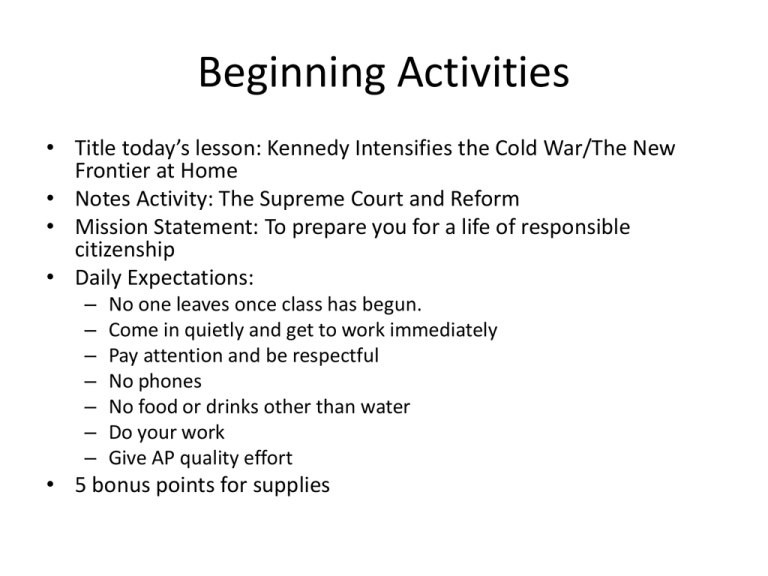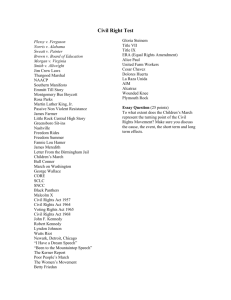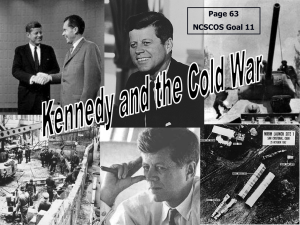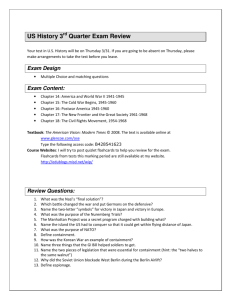Beginning Activity
advertisement

Beginning Activities • Title today’s lesson: Kennedy Intensifies the Cold War/The New Frontier at Home • Notes Activity: The Supreme Court and Reform • Mission Statement: To prepare you for a life of responsible citizenship • Daily Expectations: – – – – – – – No one leaves once class has begun. Come in quietly and get to work immediately Pay attention and be respectful No phones No food or drinks other than water Do your work Give AP quality effort • 5 bonus points for supplies Extra Credit • 5 points each 6 weeks for bringing supplies: – Paper clips – Pens – Paper – Staples – Tape Kennedy Intensifies the Cold War/The New Frontier at Home Chapter 30 The Turbulent Sixties, 1960-69 Notes Activity: The Supreme Court and Reform • Using your iPad or page 883 in your book, describe the importance of the following Supreme Court cases: – Gideon v. Wainwright (1963) – Escobedo v. Illinois (1964) – Miranda v. Arizona (1966) – Baker v. Carr (1962) – Engel v. Vitale (1962) Kennedy’s Military Goals • Close the alleged “missile gap” by building up the nation’s military • Increase the number of military units and created the Green Beret special forces • Strategy of flexible response against Soviet advances, not just threaten massive retaliation Containment in Germany and Southeast Asia • Crisis Over Berlin – The Soviets wanted to push America out of West Berlin. – Kennedy wouldn’t back down. – The Soviets constructed the Berlin Wall to prevent East Berliners from fleeing to the West. • Containment in Southeast Asia – Diem, the leader of South Vietnam, wanted American support. – Kennedy sent in military advisors and supplies. – Diem lost the support of his people and was overthrown. – Americans would not leave South Vietnam for fear that it would fall to the Communist North. Bay of Pigs Invasion • • • • • America feared communist Cuba. The CIA trained Cuban exiles to start a rebellion. Kennedy backed the idea when he got elected. The invasion occurred on April 17, 1961. The U.S. didn’t provide air support, and Castro’s men quickly put down the rebellion. • President Kennedy took full responsibility. • The U.S. put an embargo on Cuba that still exists today. Cuban Missile Crisis • In 1962, the Soviets started giving the Cubans missiles for protection against America. • JFK ordered the Navy to block further ships carrying missiles to Cuba from Russia. • Khrushchev removed the missiles if America promised not to invade Cuba. • This diplomatic victory gave America the upper hand in the Cold War and restored America’s confidence in Kennedy. • A hot line connected Moscow to Washington to speed up future negotiations and prevent war. Congressional Obstacle & Economic Advance • Northern Republicans and Southern Democrats blocked social reform bills. • Increased spending on defense and space programs boosted the economy. • Kennedy pushed for lower taxes that led to a rising economy. Kennedy & Civil Rights • Kennedy had an indirect approach to Civil Rights. • AG Robert Kennedy worked with SNCC to increase African American voter participation. • JFK appointed African Americans to government positions. • Freedom Riders forced RFK to convince the Interstate Commerce Commission to ban segregation on interstate travel. • The Kennedy Bros. forced southern universities to admit African American students. – Ex. James Meredith to Ole Miss Ending Activity • Research Activity: Civil Rights • Make sure the floor is clean • Connect to our objectives: How does this prepare you for life and the future?



